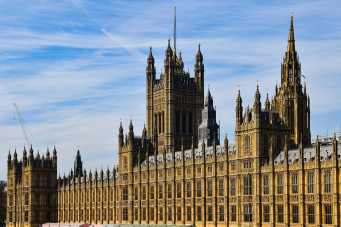
Broadcast, SVOD and staffing – 2022 in review
As we enter 2023, Frame 25 reflects on a gamechanging 12 months and looks ahead to what we can expect this year. Among the stories making the headlines, several themes stand out:
- The battle for SVOD supremacy intensifies
- Staffing shortages hit TV and film like never before
- The government’s position on IR35 continues to flip-flop, and
- The BBC begins to talk more seriously about moving its whole output online
Streaming wars
Media companies are no longer going all-in on content. According to the research firm Ampere Analysis, TV networks and streaming companies are investing less in scripted series, down 24% for the second half of the year. The focus now is on profitability, and attracting and retaining subscribers.
While some of the biggest, richest players have used mergers and acquisitions to scale their businesses in the race for market dominance, activity of this nature has fallen in the past 12 months.
Deals that did go through include, in March, Amazon’s purchase for $8.5 billion of MGM and its more than 4,000 film titles.
The following month, WarnerMedia and Discovery completed a $43billion merger to create Warner Bros. Discovery, “the biggest pure entertainment brand on the globe”. The new company, a few weeks later, agreed a deal with BT to merge Eurosport UK with BT Sport in a 50-50 joint venture.

Sport on the front line
Live sport emerged this year as a key battleground among the largest streaming companies, who acknowledge it’s a solid draw for audiences.
Discovery+/Eurosport holds European broadcast rights for the Olympics, and said its coverage of the Tokyo 2020 Games helped it attract a record number of new subscribers to take its total global subscription base to 17 million.
In the UK, Amazon continued its broadcasting of Premier League football, an arrangement it’s held since 2019, and this year paid £1.5 billion for exclusive UK broadcast rights to show top-pick Tuesday night Champions League matches.
Amazon’s deal, spanning three seasons from 2024/25, will split Champions League coverage with the competition’s existing broadcast partner BT Sport, which retains all other UK rights including the final. Paramount+ owns the US rights to Uefa games.
In the US, Apple announced in June a new $2.5 billion, 10-year partnership with Major League Soccer (MLS), showing more than 1,000 matches per year. Netflix, meanwhile, entered the race for the US Formula One rights but was beaten by Disney.
While those figures are significant, the wider context reveals the top seven streamers’ spend on programming this year totals $50 billion. Netflix alone will have invested $17 billion.
And when one parent company’s brands can stream programming including the likes of Game of Thrones, Harry Potter and the Olympics, sport’s contribution to the overall business strategy remains prominent.

Staff shortages
Staff shortages in the UK industry are not new. In 2017, the BFI committed to investing £20 million in an initiative to tackle the problem and address a lack of representation and inclusion in the workforce.
More recently, the February 2022 edition of In The Frame noted the shortage of skilled, experienced workers was leading to production delays at British film studios. Building infrastructure and developing studio space is a relatively quick process; addressing the shortage of skilled workers is not as easy.
Seetha Kumar, chief executive at ScreenSkills, the industry-led skills body for the screen industries, said: “It is great that the UK continues to be seen as a great place to make film and television and that there has been such growth, not just in production spend but in the scale and ambition of what is being made, but skills shortages are the biggest risk to continued growth and we think there is an urgent need for an injection of funding. There is no quick fix to this.”
Rising inflation has meant a fall in real wages, and the industry has experienced the growing practice of ‘show-jumping’ – when in-demand crew leave a production before it’s finished to take the offer of better-paid work elsewhere.
Reviews and negotiations
While the pool of skilled crew is limited – there simply aren’t enough trained people to do the work – a key factor behind the shortages across production has been the industry’s working culture. Long hours, “crushing daily schedules” and poor work/life balance have all contributed.
In the summer, the BFI published a Skills Review, commissioned by the DCMS and backed by Bectu. The review examined the needs for training and skills development across the production sector for scripted film and high-end TV.
Bectu called for a “rethink of the industry’s working culture” and negotiated with Pact, the Producers Alliance for Cinema and Television, to achieve better working terms and conditions. Almost a year later, Bectu members have voted to accept new working terms as set out within the Pact/Bectu TV Drama Agreement, effective from 1 January 2023.

IR35 back and forth
IR35 (explained fully here), the off-payroll legislation designed to eliminate tax avoidance through workers’ use of intermediaries or agents, has been a hot topic throughout 2022.
The rule changes of April 2017 (for public sector employers) and April 2021 (for the private sector) had been set to stay. They meant that responsibility for determining a contractor’s employment status shifted from the individual to the organisation.
Then, prior to taking office as prime minister, Liz Truss said she believed IR35 rules were unfair, as they force the self-employed to pay too much, and pledged to review the legislation. Once in Downing Street, Truss and Kwasi Kwarteng’s disastrous mini-budget included news that IR35 reform was indeed to be repealed from April 2023.
Kwarteng was soon sacked, Jeremy Hunt was appointed as chancellor, and IR35 reform was swallowed up in his series of U-turns. The Autumn Statement 2022 confirmed the off-payroll working rules will remain in place. The government hopes to raise more than £2 billion by 2028 as a result.

BBC to go online-only?
The BBC is under pressure. Like other free-to-air and public service broadcasters, it’s having to compete with SVOD services who can spend billions on content, manage the evolving viewing habits of its audience, and defend itself in the face of threatening government legislation.
The corporation’s director-general, Tim Davie, offered an interesting view in a recent speech at a Royal Television Society event.
He said the BBC could move towards an internet-only model within the next decade. That is, a future without its terrestrial TV channels or radio stations as we know them. “We must work together to ensure that everyone is connected, and can get their TV and radio via the internet,” he said. “This isn’t something to resist. A fully connected UK has very significant benefits for society and our economy. It would unleash huge opportunities for innovation.
“A switch-off of broadcast will and should happen over time, and we should be active in planning for it.”
The move has perhaps already started. CBBC and BBC Four are expected to shift to online-only output in about three years, although an exact date has not yet been established.
Other UK broadcasters are also following more digital-first strategies.
ITV has turned ITV Hub into the ad-funded video-on-demand streaming service ITVX, and is hoping the new platform can double its digital revenue by 2026 to £750m. In October, Channel 4 launched Channel 4.0, a digital-first brand focused on “reaching, engaging and entertaining 13–24-year-olds”, while Sky has already laid the ground, moving from dish to streaming with its Now TV and Sky Glass services.

How the Employment Rights Act 2025 Is Reshaping the Freelance Market

Umbrella Company Reforms - An Overview
